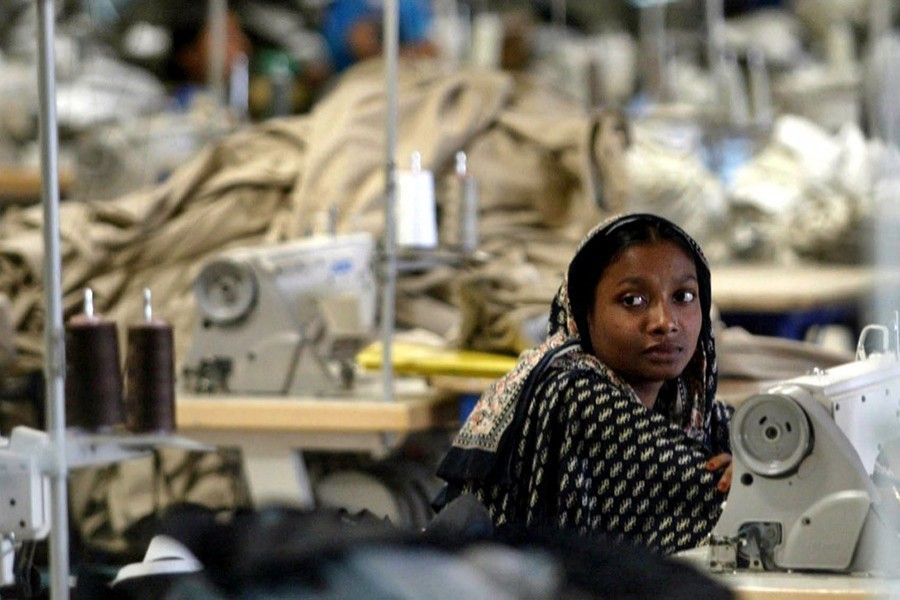BD's apparel exports may face double trouble in EU markets
Post-graduation trade regime

Published :
Updated :

Local apparel exports to the European Union markets might face double trouble during the country's post-graduation period due to losing duty benefits and likely introduction of EU's carbon border adjustment mechanism (CBAM) by then, according to a latest research report.
The EU has moved to impose the carbon tax initially in five sectors - cement, iron and steel, aluminium, fertiliser and electricity - from January next year as part of its long-term initiative, known as EU's Green Deal to transform into a carbon-neutral economy by 2050.
Though Bangladesh's major export items like apparel, leather and footwear are not included in the CBAM initially - these are among the 63 sub-sectors that are identified as sectors with a risk of carbon leakage and the EU might include these later on, according to the joint findings by Research and Policy Integration for Development and Friedrich-Ebert-Stiftung (FES) Bangladesh.
During the transition period of 2023-25, the EU importers will have to report emissions embedded in their goods without paying any financial compensation, it said, adding that from 2026 onwards they have to pay for CBAM certificates.
If non-EU exporters establish a carbon market, the corresponding cost will be deducted from the total CBAM charges, it added.
A carbon price of US$28 per tonne of CO2 on imports is equal to a 2.0 per cent import tariff.
Talking to the FE, RAPID chairman Dr MA Razzaque said the implementation of the CBAM will coincide with Bangladesh's LDC graduation timeline of November 2026 and it will lose EU EBA (everything but arms) trade preference in 2029.
It could be that if Bangladesh qualifies for GSP plus in the EU after graduation, its apparel export may not get any preference and thereby be subject to an MFN tariff of 12 per cent which is now zero per cent under the EBA, he said.
An additional carbon tax can hinder the export competitiveness of Bangladesh, he noted.
"If the coverage of CBAM is expanded to consider textile and apparel items, Bangladesh will face post-LDC tariff hikes and CBAM charges. This would result in double trouble for our exports," said Mr Razzaque, also a director of Policy Research Institute of Bangladesh.
Citing the estimates based on the energy-environmental version of GTAP (GTAP-E), he said: "Bangladesh's apparel exports to the EU could decline by 27 per cent if CBAM is extended to cover textile and clothing and if carbon price equals $90 per tonne CO2 and Bangladesh pays MFN tariff for those items after its graduation."
He, however, said that though these results are based on hypothetical scenarios with various assumptions, the bottom line is that CBAM charges along with tariff hikes on clothing items in the EU could seriously affect Bangladesh's export competitiveness.
Meanwhile, Bangladesh's major comparators have either already established or are in the process of developing carbon markets locally, according to the research paper.
China launched its carbon market in 2021 while Vietnam and India are in the process of establishing their internal carbon market. Vietnam wants to formally launch its carbon market in 2028.
The 8th five-year plan of Bangladesh aims to introduce green taxation on the consumption of fossil fuels but there is no clear directive how this would be implemented, added the paper.
"Therefore, the CBAM can disproportionately affect Bangladesh relative to other comparators," it said, adding though Bangladesh is one of the least carbon emitters, the emission rising sharply.
The paper, however, made a number of recommendations including required measures and their implementation to reduce carbon emission and initiatives to establish a carbon market.
Other suggestions included ensuring sustainable production practices of the exporting firms, adopting ESG (environmental, social and governance) compliances. It said local RMG's future performance will largely be dependent on ESG compliance.
With many green garment factories, Bangladesh has already taken a considerable stride forward. However, several additional ESG challenges like excessive water usage, weak labour standards and inadequate waste management might continue to harm export prospects.
While the country's RMG sector is under scrutiny, ESG standards for other sectors whether in the import competing or export-oriented sectors are considered to be much worse, it noted.
When asked, Bangladesh Knitwear Manufacturers and Exporters Association (BKMEA) Vice-President Fazlee Shamim Ehsan said they don't see any challenges as the local textile and clothing industry is far ahead and cleaner than other competitor countries.
"There is nothing to worry about environmental issues though much work needs to be done. We are on the right track," he claimed.
He, however, said they are not tensed by the EU moves and that they do not find those challenging.
"We as exporters know our strength, adaptability and resilience more than others," he said, explaining the measures and improvements related to workplace safety and other issues taken place in the industry after 2013.
munni_fe@yahoo.com


 For all latest news, follow The Financial Express Google News channel.
For all latest news, follow The Financial Express Google News channel.